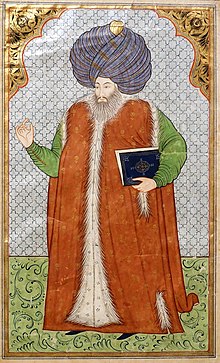Melek Ahmed Pasha
Melek Ahmed Pascha (* around 1604 in Galata , today Istanbul ; † 1662 ) was an Ottoman statesman, provincial governor and grand vizier of the Ottoman Empire under Mehmed IV. His nickname "Melek" ( German angel ) earned him his good looks.
Life
Origin, education and office as provincial governor
Ahmed's ancestors were Abkhazians or Abasins from the Caucasus . Although Ahmed was born in Galata, he grew up in the Caucasus and was brought back to Istanbul as part of the boy harvest at the age of 14 . According to one source, his father was a captain named Pervane. Sultan Murad IV appointed him governor of Diyarbakır . During the reign of Sultan İbrahim he was governor in Erzurum , Mosul , Aleppo and Damascus .
In 1644 he married Kaya Sultan , the daughter of Sultan Murad IV, and received the honorary title damad , which was reserved for men who had married into the sultan's families. While Ahmed stayed a long way from Istanbul due to his governorship, his wife stayed in the capital of the empire. Under Mehmed IV , Ahmed returned to Istanbul and became a vizier. But in 1650, to the horror of his wife, he was made governor of Baghdad, another post far from Istanbul. Kaya Sultan tried to persuade the royal regent to reverse the decision, but she was unsuccessful. But even before Melek Ahmed left Istanbul, the Grand Vizier Kara Murat Pasha resigned due to intrigues in the palace. The royal regent then offered the office to Melek Ahmed, who accepted the offer on August 5, 1650 on the condition that the palace people would not interfere in the government.
Grand Vizier
When Melek Ahmed took office, he found that the empire was almost bankrupt. The war for Crete (1645–1669) was very costly, and tax revenues from Anatolia were much lower than expected due to the Celali uprisings . He tried to balance the budget, but with no real knowledge of financial matters, his actions made the economy worse instead of improving it. One of his measures was the devaluation of the coinage by reducing the gold content of the coins. This caused resentment among the merchants, but also among the soldiers, whose salaries were paid with the new coins. The Sultan had to release him from his post on August 22, 1651. In the Ottoman Empire, coinage continued after 1651 and was the main reason for the large-scale Çınar uprising in 1656.
Late years of life
After 1651 he was reinstated as provincial governor, this time in Silistra (now in Bulgaria), much closer to the capital. Soon he could return to Istanbul. In 1654 Mustafa İbşir Pasha had been appointed Grand Vizier, but his arrival in Istanbul was delayed. During this time Melek Ahmed took his place. This aroused the suspicion of İbşir Pasha that Melek Ahmed might take the post again. Ahmed Pasha was exiled to Van and Malkara . After the removal of İbşir Pascha, Melek Ahmed Pascha was able to regain his previous title. After working in a number of provinces in the European part of the empire, in 1662 he married Fatma Sultan, daughter of the late Sultan Ahmed I. According to the historian Evliya Çelebi , the marriage was unhappy and forced on both parties. According to reports, Fatma Sultan threatened her husband with divorce and the withdrawal of her dowry, which should have equaled the annual tax receipts of Eyâlet Egypt. Melek Ahmed Pascha died in 1662 just a few months after marrying Fatma Sultan.
Evliya Çelebi and Melek Ahmed Pascha
Although Ahmed Pascha was not a particularly successful Grand Vizier, many details about Melek Ahmed Pascha and his wife Kaya as well as about his later marriage to Fatma have become known due to the books by Evliya Çelebi. Evliya Çelebi was one of the most important Turkish travel writers of his time, and his mother was the family of Melek Ahmed Pasha. Çelebi used this opportunity to travel a lot with Melek Ahmed Pascha.
Individual evidence
- ↑ a b c Robert Dankoff: Ahmed Pasha Melek . In: Encyclopaedia of Islam, THREE , accessed April 29, 2020
- ^ Ayhan Buz: Osmanlı Sadrazamları . Neden Kitap, Istanbul 2009, ISBN 978-975-254-278-5 , p. 107
- ↑ Fındıklı. Archived from the original on July 13, 2014 ; accessed on April 29, 2020 .
- ↑ Joseph von Hammer: Büyük Osmanlı Tarihi . Volume II, Milliyet Yayınları, Istanbul, p. 100
- ^ Yaşar Yücel, Ali Sevim: Türkiye tarihi . Volume III, AKDTYKTTK Yayınları, Istanbul 1991, pp. 104-106
- ↑ Robert Dankoff: An Ottoman Mentality: The World of Evliya Çelebi . BRILL, Leiden 2004, ISBN 9004137157 , p. 5 ( online at Google Books )
- ↑ Evliya Çelebi: The Intimate Life of an Ottoman Statesman, Melek Ahmed Pasha (1588-1662): As Portrayed in Evliya Celebi's Book of Travels (Seyahatname) . SUNY Press, 1991, ISBN 978-0-7914-0640-3 , p. 265
- ↑ Melek Ahmet Paşa , Uludağ sözlük, accessed on April 29, 2020
| predecessor | Office | successor |
|---|---|---|
| Kara Murad Pasha |
Grand Vizier of the Ottoman Empire August 5, 1650 - August 22, 1651 |
Abaza Siyavuş Pasha |
| personal data | |
|---|---|
| SURNAME | Melek Ahmed Pasha |
| BRIEF DESCRIPTION | Ottoman statesman, provincial governor and grand vizier |
| DATE OF BIRTH | around 1604 |
| PLACE OF BIRTH | Galata |
| DATE OF DEATH | 1662 |
